YOU decided to throw away everything you didn't truly need.
The truth? Minimalists are ordinary people who gave up accumulating possessions so that they can focus on the more meaningful things in their lives.
Here is your list of things to remember if you are thinking of decluttering your own life.
Look Inside the book, click here.
Tips # :-
1. Discard the preconception that you can’t discard your things.
We only think we’re unable to part with our possessions. But we’re all able to part with our things; we just need to become aware of the reasons why we’ve been unable to do this so far.
You’re certainly not to blame. You’re simply inexperienced—that’s all there is to it. It wasn’t a personality change I went through; I simply learned the techniques and developed a habit of getting rid of excess.
2. Discarding something takes skill.
In the same way that you won't wake up one morning and discover that you have suddenly become fluent in French if you have never even studied it, you cannot become a master at de-cluttering and parting, overnight. I have thrown away a lot, but it is taken me more than five years to do this. it is possible to do it more quickly.
The act of discarding things in itself does not take time.
Day One, you throw out the garbage.
Day Two is for selling your books and CDs.
Day Three, you sell your electric appliances.
Day Four is for selling large pieces of furniture, or taking them to the donation center. (11 Places In Singapore To Donate Clothes, Homeware & Food After CNY Spring Cleaning, Click Here) ( Also click here for other donation collection centers)
A week is actually all the time you need to reduce your possessions, no matter how much you may have. It is not the act itself but the decision to act that takes time. In the same way that your skills in a foreign language will improve with practice. so will the act of getting rid of things. The more you do it, the less time it will take to decide, and the easier it will be to say goodbye to your things. It is actually a skill.
Click here for more donation centers, Singapore only.
3. When you discard something, you gain more than you lose.
Though it may seem like reducing your possessions means you are losing out on something, I think it is best to reset our minds on that point. There are more things to gain from eliminating excess than you might imagine: time, space, freedom, and energy, for example.
You can’t help but fixate on something that you’re about to throw away because it’s right in front of you. And the potential gains from this action aren’t visible. But trust me, there is actually more to gain than there is to lose. Rather than thinking about the loss of everything you discard, direct your attention to the things that you will be gaining.
4. Ask yourself why you can’t part with your things.
There probably are not many people who will suddenly decide to reduce the number of possessions that they have and become a minimalist overnight. As I said earlier, the act of discarding things is a skill. It will be hard at first to place your possessions in a trash bag or put them up for sale. There are still a lot of items that I cannot get around to throwing away myself. But it is not something to be embarrassed about. And there is no need to get rid of everything at once. I think it is important to think about WHY there are some things that we cannot part with.
Take a minute to really focus on each item you cannot part with and ask yourself why. Is it because it was expensive? Is it because you feel guilty about throwing it away? Are you ashamed that you were never able to make good use of it? Do you feel bad for the person who gave it to you? Does it feel like you are throwing away a find memory that is attached to it? Is your vanity preventing you from parting with something? Or is it just easier to leave it where it is?
Do not worry if you cannot discard your possessions all at once. The important things is to ask yourself why you may be reluctant to part with some of your belongings. You might be surprised by the answers.
5. Minimizing is difficult, but it’s not impossible.
The Dutch philosopher Baruch de Spinoza observed that when people say something is impossible, they have already decided that they do not want to do it. Though we may have a sincere wish to part with all our excess things, our sense of comfort from owning them may be stronger.
We should not rationalize this comfort by saying that because some item is full of memories, or it was given to us by a dear friend. family, that we simply cannot let it go. Yes, such beautiful reasons may certainly exist, but often the key reason is that it would just be a lot of trouble to discard.
We tend to prefer the path of least resistance. Discarding something requires effort, and leaving it as it would definitely be the easy choice. But if we keep putting off the work of minimizing, we will eventually end up surrounded by too much.
If you really want to live as a minimalist, you need to make that desire your top priority.
6. There are limits to the capacity of your brain, your energy, and your time.
I used to have a multiple bank accounts and a lot of bank cards fattening up my wallet. While these were thin cards that did not take up much physical space, they took up a lot of the memory I had available in my brain. How much did I have left in each account? When should I withdraw the funds in each bank? What if I lost a card and someone went ahead and used it? Just going to the police and reporting the loss would take up a lot of my time.
With our fifty-thousand-year-old brain hardware, we do not have the room to waste time or energy on those little cards, or really on any extra possessions. It is wiser to clean up our system an delete all the unnecessary data so we're free to function efficiently and happily.
7. Discard something right now.
Maybe you are thinking that you will de-clutter right after you finish the project you are working on right now. Or you might say to yourself that you will get to it someday after things settle down. But we all know that as long as we're ruled by our dear old possessions, that day will never come.
We think we can’t become a minimalist until our lives have settled down. But it’s actually the other way around; we won’t be able to settle down until we’re living a minimalist life. All that tome we so desperately need is within our grasp, but we have to create it ourselves by saying goodbye to all those extra things. That's why it is a good idea to start now. Make it a top priority.
Discarding things may take some skill, but you do not have to perfect that skill before you start taking action. Do not wait until you have finished reading this blog. The best way to go about it is to hone your skills as you part with your possessions. Why not close this book this very moment and discard something?
If you wait until you have the time, you will never have the time. This is the first step, right now, toward a minimalist life.
8. There isn’t a single item you’ll regret throwing away.
Since the days of my old messy apartment, I think I have reduced my possessions to around 5 percent of what I used to own. That is 950 out of 1000 items. And you know what? There really is not a single item that I miss. Even if there has been such an item at the time, i cannot even remember what it was. That is how insignificant all those things were to me. There really is not a single item that I think about and pine over.
It seems to me that this fear of regret is what prevents us from saying goodbye. It is certainly understandable; we all have these types of fear. But if you are wondering whether you might need that ten-year-old jacket that's been sitting in the back of your closet forever, or those sea shells you picked up on the beach when you were a toddler, go ahead and tell yourself that there is probably not a single item that you will regret throwing away.
9. Start with things that are clearly junk.
The best way to get used to discarding things is to make it a habit. Let us say you want to make it a habit to go jogging early in the morning. An effective way to do this is to aim to go to the door on the first day. The objective for the second day is todo that and put on your running shoes. You gradually keep adding to your small accomplishments to achieve a bigger objective. The accumulation of small achievements is the only way to do something incredible. The same applies to throwing things away. maybe you start by throwing away some old torn-up flip-flops. The next day, you get rid of some ancient boots with holes in the bottom. You feel emboldened and throw away your mouldy old raincoat the next day. Bit by bit, you build on your achievements.
But before we get into any of that, a good basic first step is to start with what anyone would consider garbage. Throw away empty cans or food containers that are not being used. Check your refrigerator and get rid of the expired food items, or medicines. Discard clothes with holes in them. Throw away broken appliances. Start by clearing out the things that have clearly become junk.
10. Minimize anything you have in multiples.
It is easy to minimize things you have in multiple numbers. Go on, take a look. Do you have two or three pairs of scissors? Do you have a bunch of unused ballpoint pens? Two calligraphy paintbrushes? We often lose track of how many of the same items we have and still buy because we do not have a designated spot to keep them. That is often how we start cluttering up our space. And the more you have, the harder it is to know what you have.
If you have three pairs of scissors, you can start by throwing away one of them. It is easy to choose which one that will be: the pair you are not particularly fond of or the pair that you do not use. You can still cut with fewer scissors. You can still write with fewer pens.
Try to reduce the multiples of anything you have to one.
11. Get rid of it if you haven’t used it in a year.
One essential method for reducing your possessions is to discard things you have not used in a year. You should also get rid of things you have no firm plans to use in the future. You do not need to throw away the blanket, or the down jacket, you are going to be using come winter. The same goes for the bathing suit you always wear in the summer.
But if you have not used something during the past four seasons, one year, you probably do not need it. The one exception would be the emergency equipment and supplies that you keep in case of a disaster. Like items in the bomb shelter.
Dust is not very pleasant but it is a useful sign that tells us maybe it is time to consider throwing an item away. The heavier the layer of dust, the less we have used something. An item that you have not used this past year probably won't suddenly become necessary next year or the year after that. And if there is something you happen to use once every three years, why not rent it when you need it? Let us free up all the time and energy we spend maintaining things we never use.
12. Discard it if you have it for the sake of appearance.
We’re of course all concerned with how others see us. Everyone goes the extra mile to project their intended image. The possessions that we truly enjoy, however, are the things we use often that don’t require a lot of effort to maintain.
And while the trappings of a successful lifestyle are tempting, you might want to consider letting go of the things you keep just to show off to others.


13. Differentiate between things you want and things you need.
Here is an exaggerated example. You're climbing a mountain but you're well equipped. You're wearing thin clothing, you do not know anything about the environment, and you get lost. The temperature drops, it starts pouring rain, and you're trembling from the cold. Desperate, you finally find a small lodge where you step inside and warm your freezing body with a blanket. That blanket is an item that you truly need.
In our everyday lives, though, vast inventories of goods are available for sale just a short walk or drive away. On offer are the latest electrical appliances, stylish goods and accessories, gorgeous high-fashion apparel, and everything else we would ever want. A single warm blanket is enough when you are stranded on a mountain, and yet back at home you would probably want a second blanket in a nice colour and then a third, higher-quality blanket with a more luxurious texture.
You can avoid buying more things simply by first asking yourself if it is something that you actually need. Put your hand against you chest when you are not sure about an item, and it will feel uncomfortable if the item is merely something that you want. This discomfort isa symptom of dissatisfaction, of the mistaken belief that there's something missing from your life even though you already have everything you needs. You need essentials of life, but you only want fancies of ego.
14. Take photos of the items that are tough to part with.
Call me sentimental, but I like to take pictures of the things I am about to part with, to soften the blow. This is something that I still do from time to time -- just the other day I took a picture of an old pair of nail clippers before I got rid of them. You're probably wondering what I do with these images. I do not think I have even looked at them myself . I take them photos to preserve the memories that are associated with these belongings.
I think throwing away your material possessions and throwing away your memories are two completely different actions. As long as you still have the images, you will be able to recall your experiences. A work of art that your child made in grade school, a souvenir from a trip, or a gift that someone gave you -- take pictures of them and it will be easier to throw these things away when you feel like you can't. I can say from experience that it's very unlikely that you'll actually go back and look at the images. I have taken thousands of pictures and I think I am just about ready to delete them. When I do, I know it will mean that I have started to become more focused on the present. Until the day comes when I can discard unnecessary things without a second thought, i think I will continue to snap away.
15. It’s easier to revisit your memories once you go digital.
As a fan of film photography, there is no telling how much I spent on film and development costs. I always had my favourite compact camera tucked away in my bag and I loved taking pictures, but what I was not very good at was organizing the material afterward. The photo prints and the negatives were stuffed haphazardly in bags after I had them developed, and it was impossible to tell when they'd been taken. I put them away in my closet and it was a hassle to even pull them out.
Once I decided to go minimalist, I scanned all my prints on ScanSnap , as well as the letters I'd received from people over the years, and made everything digital. it is now easy to see them on my computer if the mood strikes, and with the dates and places included in the names of the folders, the materials make sense chronologically. And by backing everything up in the cloud storage, I can access my precious albums wherever I may be in the world.
16. Our things are like roommates, except we pay their rent.
In Japan, it is said that you need half a tatami mat for someone to be seated and a full one (about sixteen square feet or 1.48645 square meter) for them to sleep. That is actually all the space we need to get by. If we aded a roommate, it would just mean we need enough space for another tatami mat. In that sense, the rent would not increase that much if a friend were to come live with you.
But whether or not someone is actually living with us, we all have a roommate. We call them 'Our Things." And the space they need is far beyond that half or full tatami mat I just described.

We all would like to live in a nice, spacious home. But when you really think seriously about it, we just want to allow Our Things to live in a comfortable environment. And what do we get in return? Our Things are not going to pitch in with the rent, and they are not going to help us take care of the household chores. Instead, they create extra work for us. Do we really want to continue to pay the rent for them? It is wiser to kick them out.
17. Organizing is not minimizing.
We Japanese have a custom of tackling major housecleaning at the end of the year. We throw some things out, we clean up anything we have lying around, and we put it all out of sight. We attempt to make good use of unused space and stow our belongings so they won't get in the way as we go about our daily lives. But as time passes, we become busy with other things, and naturally, we’re back with our clutter a year later. Unless we're extremely fastidious, we will end up going through this cycle time and again. This is because organizing is not minimizing.
Instead of relying on organization techniques, you should first focus on decreasing the amount of things you have to put away. Once you do that, your space will naturally become less cluttered; the cycle will be broken. I have so few items in my apartment, it simply does not get cluttered. The concept of clutter itself has left me!
18. Tackle the nest (storage) before the pest (clutter).
Click here.
19. Leave your “unused” space empty.
When we talk about home organization, the concept of "unused" space becomes important. We see an area where we have not put anything, and we think of it as unused space. Naturally, we put out various skills to use and try to fill the void.
For example, we set up our washing machines in a designated spot at home and then notice the unused space overhead. Particularly with the limited size of apartment, we try to make efficient use of what we have. So what we often do is set up a rack over our washing machines where we can store towels, laundry detergent, fabric softener, bleach, and so on.
But of course that isn't the end of it. We often put up a pole from one wall to another, place hangers and hooks onto it, and rejoice in the ingenious storage space that we have created. But this is actually a step away from downsizing, from living in comfort. Once we have extra storage space, we inevitably start to store extra things. The items on that pole will eventually start to overflow.
A storage area packed with our possessions is like a crowded commuter train. it is not a soothing sight. And it takes more time and effort than we think to maintain its initial state. IT is actually open space, left empty, that ives us peace of mind. While your brain may at first think of them as 'unused" spaces, these open areas are incredibly useful. they bring us a sense of freedom and keep our minds open to the more important things in life.
20. Let go of the idea of “someday”.
When we buy an electrical appliance, it usually comes with a lot of attachment. Think of all those parts for your vacuum cleaner , Kirby or Electrolux, that you've never used. What's that little screw for, anyway? You keep all those parts and accessories, wires because think you might need them "someday." I don't know about you, my friends, but I've never actually used a warranty. They now go straight into the trash bin can.
We're always thinking about "someday." We keep empty cookie tins , recycled plastic containers, or beautiful paper bags, thinking they might come in handy someday. Many things get accumulated, yet that "someday" is not yet here. We hold on to foreign language textbooks because we're going to start studying someday. We'll get to all those hobby items and tools once things quiet down. Someday. That's what we tell ourselves. But we know by now that that time is probably never going to come. May I make a gentle suggestion? Let go of "someday." And be free, be happy , be grateful for today. Things we do not need now will probably never be needed.
21. Say goodbye to who you used to be.
When discarding anything, it’s important to consider whether it is something that you need right now. In the same way that trying to prepare for someday in the future is futile, so is clinging to what used to be in the past.
The text books you used in school, the books that opened up your eyes to the world when you were a child, that favorite outfit that once made you shine -- memories are wonderful, but you won't have room to develop if your attachment to the past is too strong. It's better to cut some of those old ties so you can focus on what is important today.
Holding on to things from the past is the same as clinging to an image of yourself in the past. If you’re the least bit interested in changing anything about yourself, I suggest you be brave and start letting things go. Leave only the items that you need moving forward from this very moment.
22. Discard the things you have already forgotten about.
(click here to continue learning the skill of letting go)
Goodbye things, hello minimalism: can living with less make you happier?
Fumio Sasaki owns a roll-up mattress, three shirts and four pairs of socks. After deciding to scorn possessions, he began feeling happier. He explains why.
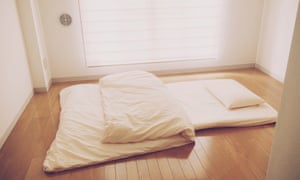
‘This is what the place looks like when I sleep’ ... Fumio Sasaki’s apartment in Japan.
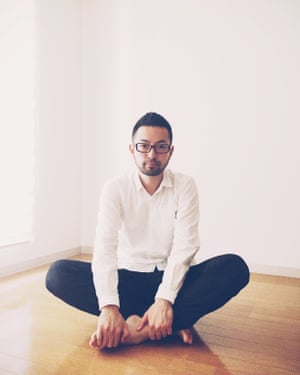

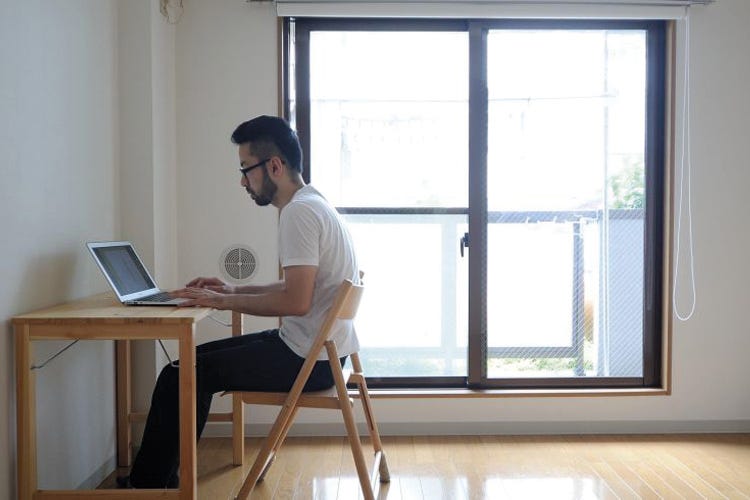
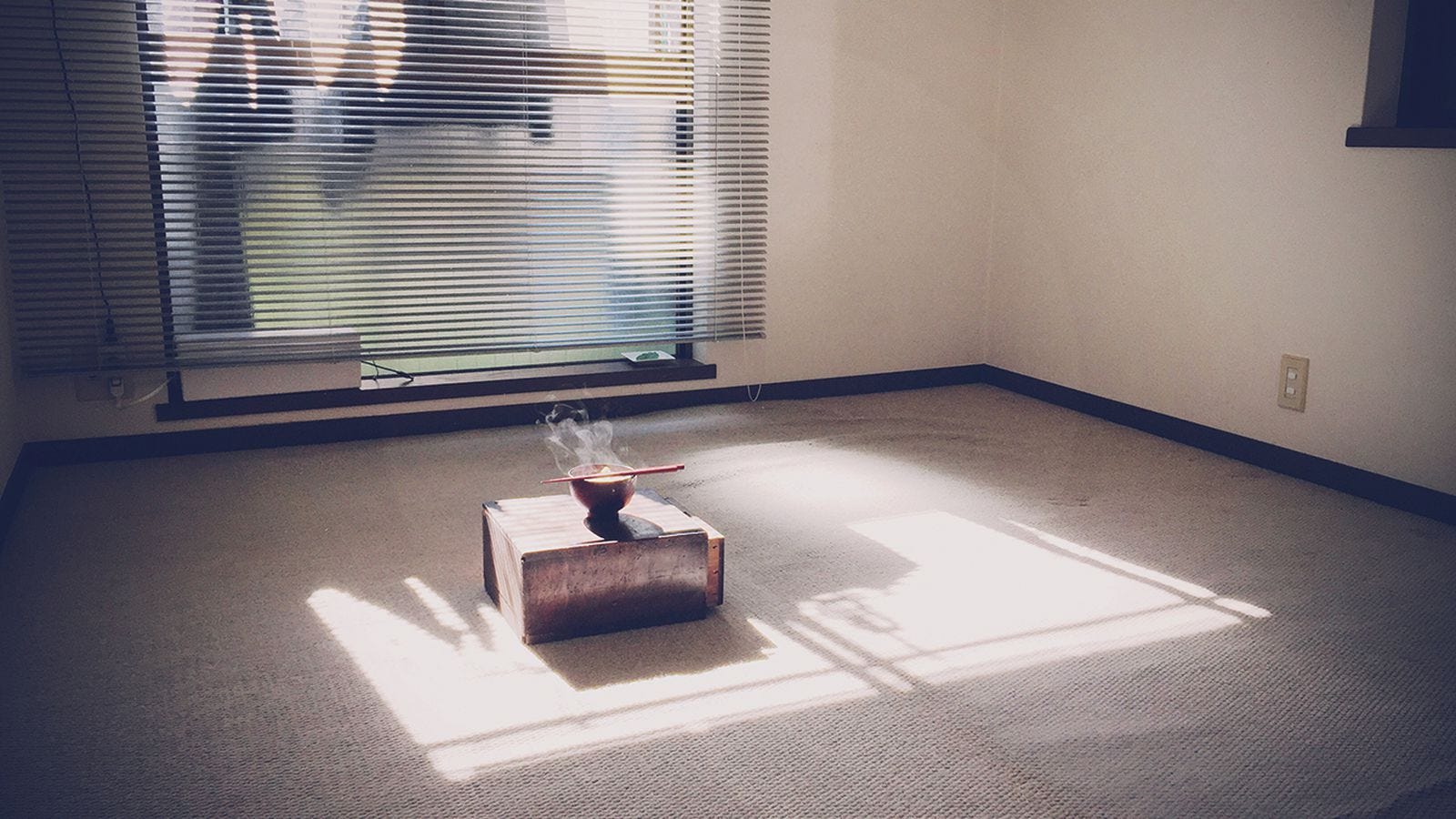
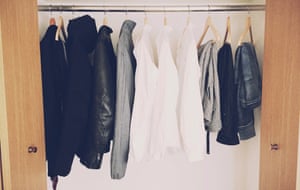
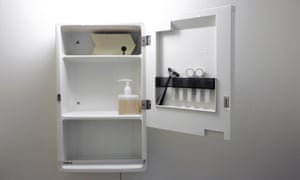
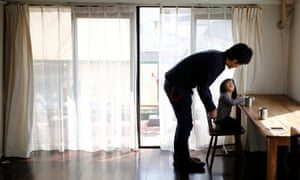
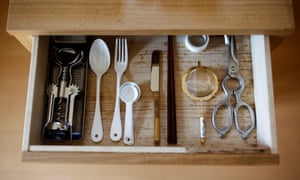
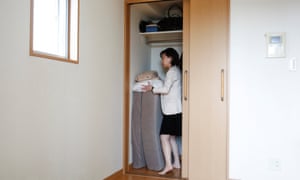
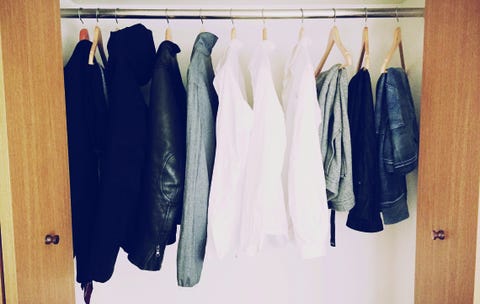
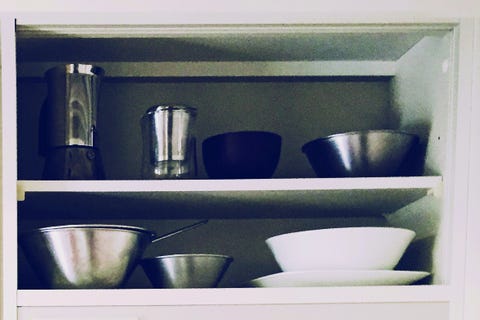
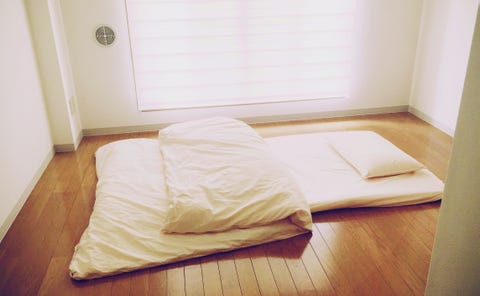
The truth? Minimalists are ordinary people who gave up accumulating possessions so that they can focus on the more meaningful things in their lives.
Here is your list of things to remember if you are thinking of decluttering your own life.
Look Inside the book, click here.
Tips # :-
1. Discard the preconception that you can’t discard your things.
We only think we’re unable to part with our possessions. But we’re all able to part with our things; we just need to become aware of the reasons why we’ve been unable to do this so far.
You’re certainly not to blame. You’re simply inexperienced—that’s all there is to it. It wasn’t a personality change I went through; I simply learned the techniques and developed a habit of getting rid of excess.
2. Discarding something takes skill.
In the same way that you won't wake up one morning and discover that you have suddenly become fluent in French if you have never even studied it, you cannot become a master at de-cluttering and parting, overnight. I have thrown away a lot, but it is taken me more than five years to do this. it is possible to do it more quickly.
The act of discarding things in itself does not take time.
Day One, you throw out the garbage.
Day Two is for selling your books and CDs.
Day Three, you sell your electric appliances.
Day Four is for selling large pieces of furniture, or taking them to the donation center. (11 Places In Singapore To Donate Clothes, Homeware & Food After CNY Spring Cleaning, Click Here) ( Also click here for other donation collection centers)
A week is actually all the time you need to reduce your possessions, no matter how much you may have. It is not the act itself but the decision to act that takes time. In the same way that your skills in a foreign language will improve with practice. so will the act of getting rid of things. The more you do it, the less time it will take to decide, and the easier it will be to say goodbye to your things. It is actually a skill.
Click here for more donation centers, Singapore only.
3. When you discard something, you gain more than you lose.
Though it may seem like reducing your possessions means you are losing out on something, I think it is best to reset our minds on that point. There are more things to gain from eliminating excess than you might imagine: time, space, freedom, and energy, for example.
You can’t help but fixate on something that you’re about to throw away because it’s right in front of you. And the potential gains from this action aren’t visible. But trust me, there is actually more to gain than there is to lose. Rather than thinking about the loss of everything you discard, direct your attention to the things that you will be gaining.
4. Ask yourself why you can’t part with your things.
There probably are not many people who will suddenly decide to reduce the number of possessions that they have and become a minimalist overnight. As I said earlier, the act of discarding things is a skill. It will be hard at first to place your possessions in a trash bag or put them up for sale. There are still a lot of items that I cannot get around to throwing away myself. But it is not something to be embarrassed about. And there is no need to get rid of everything at once. I think it is important to think about WHY there are some things that we cannot part with.
Take a minute to really focus on each item you cannot part with and ask yourself why. Is it because it was expensive? Is it because you feel guilty about throwing it away? Are you ashamed that you were never able to make good use of it? Do you feel bad for the person who gave it to you? Does it feel like you are throwing away a find memory that is attached to it? Is your vanity preventing you from parting with something? Or is it just easier to leave it where it is?
Do not worry if you cannot discard your possessions all at once. The important things is to ask yourself why you may be reluctant to part with some of your belongings. You might be surprised by the answers.
5. Minimizing is difficult, but it’s not impossible.
The Dutch philosopher Baruch de Spinoza observed that when people say something is impossible, they have already decided that they do not want to do it. Though we may have a sincere wish to part with all our excess things, our sense of comfort from owning them may be stronger.
We should not rationalize this comfort by saying that because some item is full of memories, or it was given to us by a dear friend. family, that we simply cannot let it go. Yes, such beautiful reasons may certainly exist, but often the key reason is that it would just be a lot of trouble to discard.
We tend to prefer the path of least resistance. Discarding something requires effort, and leaving it as it would definitely be the easy choice. But if we keep putting off the work of minimizing, we will eventually end up surrounded by too much.
If you really want to live as a minimalist, you need to make that desire your top priority.
6. There are limits to the capacity of your brain, your energy, and your time.
I used to have a multiple bank accounts and a lot of bank cards fattening up my wallet. While these were thin cards that did not take up much physical space, they took up a lot of the memory I had available in my brain. How much did I have left in each account? When should I withdraw the funds in each bank? What if I lost a card and someone went ahead and used it? Just going to the police and reporting the loss would take up a lot of my time.
With our fifty-thousand-year-old brain hardware, we do not have the room to waste time or energy on those little cards, or really on any extra possessions. It is wiser to clean up our system an delete all the unnecessary data so we're free to function efficiently and happily.
7. Discard something right now.
Maybe you are thinking that you will de-clutter right after you finish the project you are working on right now. Or you might say to yourself that you will get to it someday after things settle down. But we all know that as long as we're ruled by our dear old possessions, that day will never come.
We think we can’t become a minimalist until our lives have settled down. But it’s actually the other way around; we won’t be able to settle down until we’re living a minimalist life. All that tome we so desperately need is within our grasp, but we have to create it ourselves by saying goodbye to all those extra things. That's why it is a good idea to start now. Make it a top priority.
Discarding things may take some skill, but you do not have to perfect that skill before you start taking action. Do not wait until you have finished reading this blog. The best way to go about it is to hone your skills as you part with your possessions. Why not close this book this very moment and discard something?
If you wait until you have the time, you will never have the time. This is the first step, right now, toward a minimalist life.
8. There isn’t a single item you’ll regret throwing away.
Since the days of my old messy apartment, I think I have reduced my possessions to around 5 percent of what I used to own. That is 950 out of 1000 items. And you know what? There really is not a single item that I miss. Even if there has been such an item at the time, i cannot even remember what it was. That is how insignificant all those things were to me. There really is not a single item that I think about and pine over.
It seems to me that this fear of regret is what prevents us from saying goodbye. It is certainly understandable; we all have these types of fear. But if you are wondering whether you might need that ten-year-old jacket that's been sitting in the back of your closet forever, or those sea shells you picked up on the beach when you were a toddler, go ahead and tell yourself that there is probably not a single item that you will regret throwing away.
9. Start with things that are clearly junk.
The best way to get used to discarding things is to make it a habit. Let us say you want to make it a habit to go jogging early in the morning. An effective way to do this is to aim to go to the door on the first day. The objective for the second day is todo that and put on your running shoes. You gradually keep adding to your small accomplishments to achieve a bigger objective. The accumulation of small achievements is the only way to do something incredible. The same applies to throwing things away. maybe you start by throwing away some old torn-up flip-flops. The next day, you get rid of some ancient boots with holes in the bottom. You feel emboldened and throw away your mouldy old raincoat the next day. Bit by bit, you build on your achievements.
But before we get into any of that, a good basic first step is to start with what anyone would consider garbage. Throw away empty cans or food containers that are not being used. Check your refrigerator and get rid of the expired food items, or medicines. Discard clothes with holes in them. Throw away broken appliances. Start by clearing out the things that have clearly become junk.
10. Minimize anything you have in multiples.
It is easy to minimize things you have in multiple numbers. Go on, take a look. Do you have two or three pairs of scissors? Do you have a bunch of unused ballpoint pens? Two calligraphy paintbrushes? We often lose track of how many of the same items we have and still buy because we do not have a designated spot to keep them. That is often how we start cluttering up our space. And the more you have, the harder it is to know what you have.
If you have three pairs of scissors, you can start by throwing away one of them. It is easy to choose which one that will be: the pair you are not particularly fond of or the pair that you do not use. You can still cut with fewer scissors. You can still write with fewer pens.
Try to reduce the multiples of anything you have to one.
11. Get rid of it if you haven’t used it in a year.
One essential method for reducing your possessions is to discard things you have not used in a year. You should also get rid of things you have no firm plans to use in the future. You do not need to throw away the blanket, or the down jacket, you are going to be using come winter. The same goes for the bathing suit you always wear in the summer.
But if you have not used something during the past four seasons, one year, you probably do not need it. The one exception would be the emergency equipment and supplies that you keep in case of a disaster. Like items in the bomb shelter.
Dust is not very pleasant but it is a useful sign that tells us maybe it is time to consider throwing an item away. The heavier the layer of dust, the less we have used something. An item that you have not used this past year probably won't suddenly become necessary next year or the year after that. And if there is something you happen to use once every three years, why not rent it when you need it? Let us free up all the time and energy we spend maintaining things we never use.
12. Discard it if you have it for the sake of appearance.
We’re of course all concerned with how others see us. Everyone goes the extra mile to project their intended image. The possessions that we truly enjoy, however, are the things we use often that don’t require a lot of effort to maintain.
And while the trappings of a successful lifestyle are tempting, you might want to consider letting go of the things you keep just to show off to others.


13. Differentiate between things you want and things you need.
Here is an exaggerated example. You're climbing a mountain but you're well equipped. You're wearing thin clothing, you do not know anything about the environment, and you get lost. The temperature drops, it starts pouring rain, and you're trembling from the cold. Desperate, you finally find a small lodge where you step inside and warm your freezing body with a blanket. That blanket is an item that you truly need.
In our everyday lives, though, vast inventories of goods are available for sale just a short walk or drive away. On offer are the latest electrical appliances, stylish goods and accessories, gorgeous high-fashion apparel, and everything else we would ever want. A single warm blanket is enough when you are stranded on a mountain, and yet back at home you would probably want a second blanket in a nice colour and then a third, higher-quality blanket with a more luxurious texture.
You can avoid buying more things simply by first asking yourself if it is something that you actually need. Put your hand against you chest when you are not sure about an item, and it will feel uncomfortable if the item is merely something that you want. This discomfort isa symptom of dissatisfaction, of the mistaken belief that there's something missing from your life even though you already have everything you needs. You need essentials of life, but you only want fancies of ego.
14. Take photos of the items that are tough to part with.
Call me sentimental, but I like to take pictures of the things I am about to part with, to soften the blow. This is something that I still do from time to time -- just the other day I took a picture of an old pair of nail clippers before I got rid of them. You're probably wondering what I do with these images. I do not think I have even looked at them myself . I take them photos to preserve the memories that are associated with these belongings.
I think throwing away your material possessions and throwing away your memories are two completely different actions. As long as you still have the images, you will be able to recall your experiences. A work of art that your child made in grade school, a souvenir from a trip, or a gift that someone gave you -- take pictures of them and it will be easier to throw these things away when you feel like you can't. I can say from experience that it's very unlikely that you'll actually go back and look at the images. I have taken thousands of pictures and I think I am just about ready to delete them. When I do, I know it will mean that I have started to become more focused on the present. Until the day comes when I can discard unnecessary things without a second thought, i think I will continue to snap away.
15. It’s easier to revisit your memories once you go digital.
As a fan of film photography, there is no telling how much I spent on film and development costs. I always had my favourite compact camera tucked away in my bag and I loved taking pictures, but what I was not very good at was organizing the material afterward. The photo prints and the negatives were stuffed haphazardly in bags after I had them developed, and it was impossible to tell when they'd been taken. I put them away in my closet and it was a hassle to even pull them out.
Once I decided to go minimalist, I scanned all my prints on ScanSnap , as well as the letters I'd received from people over the years, and made everything digital. it is now easy to see them on my computer if the mood strikes, and with the dates and places included in the names of the folders, the materials make sense chronologically. And by backing everything up in the cloud storage, I can access my precious albums wherever I may be in the world.
16. Our things are like roommates, except we pay their rent.
In Japan, it is said that you need half a tatami mat for someone to be seated and a full one (about sixteen square feet or 1.48645 square meter) for them to sleep. That is actually all the space we need to get by. If we aded a roommate, it would just mean we need enough space for another tatami mat. In that sense, the rent would not increase that much if a friend were to come live with you.
But whether or not someone is actually living with us, we all have a roommate. We call them 'Our Things." And the space they need is far beyond that half or full tatami mat I just described.

We all would like to live in a nice, spacious home. But when you really think seriously about it, we just want to allow Our Things to live in a comfortable environment. And what do we get in return? Our Things are not going to pitch in with the rent, and they are not going to help us take care of the household chores. Instead, they create extra work for us. Do we really want to continue to pay the rent for them? It is wiser to kick them out.
17. Organizing is not minimizing.
We Japanese have a custom of tackling major housecleaning at the end of the year. We throw some things out, we clean up anything we have lying around, and we put it all out of sight. We attempt to make good use of unused space and stow our belongings so they won't get in the way as we go about our daily lives. But as time passes, we become busy with other things, and naturally, we’re back with our clutter a year later. Unless we're extremely fastidious, we will end up going through this cycle time and again. This is because organizing is not minimizing.
Instead of relying on organization techniques, you should first focus on decreasing the amount of things you have to put away. Once you do that, your space will naturally become less cluttered; the cycle will be broken. I have so few items in my apartment, it simply does not get cluttered. The concept of clutter itself has left me!
18. Tackle the nest (storage) before the pest (clutter).
Click here.
19. Leave your “unused” space empty.
When we talk about home organization, the concept of "unused" space becomes important. We see an area where we have not put anything, and we think of it as unused space. Naturally, we put out various skills to use and try to fill the void.
For example, we set up our washing machines in a designated spot at home and then notice the unused space overhead. Particularly with the limited size of apartment, we try to make efficient use of what we have. So what we often do is set up a rack over our washing machines where we can store towels, laundry detergent, fabric softener, bleach, and so on.
But of course that isn't the end of it. We often put up a pole from one wall to another, place hangers and hooks onto it, and rejoice in the ingenious storage space that we have created. But this is actually a step away from downsizing, from living in comfort. Once we have extra storage space, we inevitably start to store extra things. The items on that pole will eventually start to overflow.
A storage area packed with our possessions is like a crowded commuter train. it is not a soothing sight. And it takes more time and effort than we think to maintain its initial state. IT is actually open space, left empty, that ives us peace of mind. While your brain may at first think of them as 'unused" spaces, these open areas are incredibly useful. they bring us a sense of freedom and keep our minds open to the more important things in life.
20. Let go of the idea of “someday”.
When we buy an electrical appliance, it usually comes with a lot of attachment. Think of all those parts for your vacuum cleaner , Kirby or Electrolux, that you've never used. What's that little screw for, anyway? You keep all those parts and accessories, wires because think you might need them "someday." I don't know about you, my friends, but I've never actually used a warranty. They now go straight into the trash bin can.
We're always thinking about "someday." We keep empty cookie tins , recycled plastic containers, or beautiful paper bags, thinking they might come in handy someday. Many things get accumulated, yet that "someday" is not yet here. We hold on to foreign language textbooks because we're going to start studying someday. We'll get to all those hobby items and tools once things quiet down. Someday. That's what we tell ourselves. But we know by now that that time is probably never going to come. May I make a gentle suggestion? Let go of "someday." And be free, be happy , be grateful for today. Things we do not need now will probably never be needed.
21. Say goodbye to who you used to be.
When discarding anything, it’s important to consider whether it is something that you need right now. In the same way that trying to prepare for someday in the future is futile, so is clinging to what used to be in the past.
The text books you used in school, the books that opened up your eyes to the world when you were a child, that favorite outfit that once made you shine -- memories are wonderful, but you won't have room to develop if your attachment to the past is too strong. It's better to cut some of those old ties so you can focus on what is important today.
Holding on to things from the past is the same as clinging to an image of yourself in the past. If you’re the least bit interested in changing anything about yourself, I suggest you be brave and start letting things go. Leave only the items that you need moving forward from this very moment.
22. Discard the things you have already forgotten about.
(click here to continue learning the skill of letting go)
Goodbye things, hello minimalism: can living with less make you happier?
Fumio Sasaki owns a roll-up mattress, three shirts and four pairs of socks. After deciding to scorn possessions, he began feeling happier. He explains why.

‘This is what the place looks like when I sleep’ ... Fumio Sasaki’s apartment in Japan.
Let me tell you a bit about myself. I’m 35 years old, male, single, never been married. I work as an editor at a publishing company. I recently moved from the Nakameguro neighbourhood in Tokyo, where I lived for a decade, to a neighbourhood called Fudomae in a different part of town. The rent is cheaper, but the move pretty much wiped out my savings.
Some of you may think that I’m a loser: an unmarried adult with not much money. The old me would have been way too embarrassed to admit all this. I was filled with useless pride. But I honestly don’t care about things like that any more. The reason is very simple: I’m perfectly happy just as I am.
The reason? I got rid of most of my material possessions.
Minimalism is a lifestyle in which you reduce your possessions to the least possible. Living with only the bare essentials has not only provided superficial benefits such as the pleasure of a tidy room or the simple ease of cleaning, it has also led to a more fundamental shift. It’s given me a chance to think about what it really means to be happy.
We think that the more we have, the happier we will be. We never know what tomorrow might bring, so we collect and save as much as we can. This means we need a lot of money, so we gradually start judging people by how much money they have. You convince yourself that you need to make a lot of money so you don’t miss out on success. And for you to make money, you need everyone else to spend their money. And so it goes.
‘Here’s a look in my closet, from a down jacket to a suit, some white shirts, and the few pairs of trousers that match in a simple style. I am aiming to create my own uniform with a signature style like Steve Jobs had’
I wasn’t always a minimalist. I used to buy a lot of things, believing that all those possessions would increase my self-worth and lead to a happier life. I loved collecting a lot of useless stuff, and I couldn’t throw anything away. I was a natural hoarder of knickknacks that I thought made me an interesting person.
At the same time, though, I was always comparing myself with other people who had more or better things, which often made me miserable. I couldn’t focus on anything, and I was always wasting time. Alcohol was my escape, and I didn’t treat women fairly. I didn’t try to change; I thought this was all just part of who I was, and I deserved to be unhappy.
My apartment wasn’t horribly messy; if my girlfriend was coming over for the weekend, I could do enough tidying up to make it look presentable. On a usual day, however, there were books stacked everywhere because there wasn’t enough room on my bookshelves. Most I had thumbed through once or twice, thinking that I would read them when I had the time.
Fumio Sasaki

‘I was miserable, and I made other people miserable, too’ … Fumio Sasaki.
The closet was crammed with what used to be my favourite clothes,most of which I’d only worn a few times. The room was filled with all the things I’d taken up as hobbies and then gotten tired of. A guitar and amplifier, covered with dust. Conversational English workbooks I’d planned to study once I had more free time. Even a fabulous antique camera, which of course I had never once put a roll of film in.
Meanwhile, I kept comparing myself with others. A friend from college lived in a posh condo on newly developed land in Tokyo. It had a glitzy entrance and stylish Scandinavian furniture. When I visited, I found myself calculating his rent in my head as he graciously invited me in. He worked for a big company, earned a good salary, married his gorgeous girlfriend, and they’d had a beautiful baby, all dressed up in fashionable babywear. We’d been kind of alike back in college. What had happened, I thought? How did our lives drift so far apart?
Or I’d see a pristine white Ferrari convertible speeding by, showing off, probably worth twice the value of my apartment. I’d gaze dumbly at the car as it disappeared from view, one foot on the pedal of my secondhand bicycle.
I bought lottery tickets, hoping I could catch up in a flash. I broke up with my girlfriend, telling her I couldn’t see a future for us in my sad financial state. All the while, I carefully hid my inferiority complex and acted as though there was nothing wrong with my life. But I was miserable, and I made other people miserable, too.
It may sound as if I’m exaggerating when I say I started to become a new person. Someone said to me: “All you did is throw things away,” which is true. But by having fewer things around, I’ve started feeling happier each day. I’m slowly beginning to understand what happiness is.
If you are anything like I used to be – miserable, constantly comparing yourself with others, or just believing your life sucks – I think you should try saying goodbye to some of your things. Yes, there are certainly people who haven’t ever been attached to material objects, or those rare geniuses who can thrive amid the chaos of their possessions. But I want to think about the ways that ordinary people like you and me can find the real pleasures in life. Everyone wants to be happy. But trying to buy happiness only makes us happy for a little while. We are lost when it comes to true happiness.
After what I’ve been through, I think saying goodbye to your things is more than an exercise in tidying up. I think it’s an exercise in learning about true happiness.
Maybe that sounds grandiose. But I seriously think it’s true.
This is an edited extract from Goodbye, Things by Fumio Sasaki, published by Particular Books.
Goodbye, Things: The New Japanese Minimalism by Fumio Sasaki
Published 2015.

I am drawn to minimalism for several reasons. I like the efficiency of a minimal lifestyle, decluttered, clean and open. Multi-function gadgets and organization tools that have varied uses are appealing from a design aesthetic. The idea of having so few items I can pack it all in a day and travel the world is tantalizing. But I’m not a minimalist, more a recovering maximalist.
I was drawn to this book by the clean cover and beautiful pictures at the beginning. Sasaki has written a very practical book advocating for a minimal lifestyle and has provided some tips on how to reduce the number of belongings, not just crowding a small Japanese apartment, but thoughts and emotions as well. Sasaki’s argument is what many minimalists proselytize: minimalism is freeing.
The ideas in this book are pragmatic such as the “one in, one out” rule when getting something you remove something else, while other tips are more emotional like holding your hand over your heart and determining if you are uncomfortable keeping the item. There are about 50 practical tips total running a whole range from a beginner declutterer to the advanced ascetic leading a simple life. If hesitant to get rid of items, the author reminds us that digital photographs, requiring no physical space, can often spark the same emotions as a physical object.

Sasaki defines “minimal” as retaining just what is necessary for an individual. However, I feel that he often brags about how much he has eliminated from his life, including a TV and almost all of his clothes. He praises others who have maybe just a cushion on the floor and a teacup. While we may be living in a maximalist society, it seems unnecessary to swing so far in the other direction that we own nothing. Both can be compensating for a more significant issue regardless of how much someone owns. Just because one possesses more, does not mean he or she is automatically living a happy life.
I enjoyed the practical writing of this book, but it’s too extreme for my lifestyle. I believe most people could eliminate many things, objects, moments and such from their lives. However, going to the other extreme of just having one shirt, one pair of pants to wear day after day, just seems unnecessary.

Three shirts, four pairs of trousers: meet Japan's 'hardcore' minimalists.

Fumio Sasaki gave away the majority of his possessions and now lives with just the bare essentials.

Fumio Sasaki’s one-room Tokyo apartment is so stark friends liken it to an interrogation room. He owns three shirts, four pairs of trousers, four pairs of socks and a meagre scattering of various other items.
Money isn’t the issue. The 36-year-old editor has made a conscious lifestyle choice, joining a growing number of Japanese deciding that less is more.
Influenced by the spare aesthetic of Japan’s traditional Zen Buddhism, minimalists buck the norm in a fervently consumerist society by dramatically paring back their possessions.
Sasaki, once a passionate collector of books, CDs and DVDs, became tired of keeping up with trends two years ago.
“I kept thinking about what I did not own, what was missing,” he says.
He spent the next year selling possessions or giving them to friends.
“Spending less time on cleaning or shopping means I have more time to spend with friends, go out, or travel on my days off. I have become a lot more active,” he says.
Minimalist Naoki Numahata talks to his two-and-a-half year old daughter Ei in their living-room in Tokyo.

Minimalist Naoki Numahata talks to his two-and-a-half-year-old daughter, Ei, in their living-room in Tokyo. Photograph: Thomas Peter/Reuters
Others welcome the chance to own only things they truly like – a philosophy also applied by Mari Kondo, a consultant whose “KonMari” organisational methods have swept the United States.
“It’s not that I had more things than the average person, but that didn’t mean that I valued or liked everything I owned,” says Katsuya Toyoda, an online publication editor who has only one table and one futon in his 22 sq metre apartment.
“I became a minimalist so I could let things I truly liked surface in my life.“
Inspiration for Japan’s minimalists came from the US, where early adherents included Steve Jobs.
Definitions vary, because the goal is not just decluttering but re-evaluating what posessions mean, to gain something else – in Sasaki’s case, time to travel.
Utensils lie in a kitchen drawer in the home of minimalist Saeko Kushibiki in Fujisawa, south of Tokyo.

Utensils lie in a kitchen drawer in the home of minimalist Saeko Kushibiki in Fujisawa, south of Tokyo. Photograph: Thomas Peter/Reuters
Sasaki and others believe there are thousands of hardcore minimalists, with possibly thousands more interested.
Some say minimalism is actually not foreign but a natural outgrowth of Zen Buddhism and its stripped-down world view.
“In the west, making a space complete means placing something there,” says Naoki Numahata, 41, a freelance writer.
“But with tea ceremonies, or Zen, things are left incomplete on purpose to let the person’s imagination make that space complete.”
Minimalists also argue that having fewer possessions is eminently practical in Japan, which is regularly shaken by earthquakes.
Minimalist Saeko Kushibiki stores away her futon mattress in her apartment in Fujisawa.

Minimalist Saeko Kushibiki stores away her futon mattress in her apartment in Fujisawa. Photograph: Thomas Peter/Reuters
In 2011, a 9.0 magnitude quake and tsunami killed nearly 20,000 people and led to many re-evaluating possessions, Sasaki said.
“Thirty to 50% of earthquake injuries occur through falling objects,” he said, gesturing around his empty apartment.
“But in this room, you don’t have that concern.”
Why You Should Throw Out 90% of Your Possessions
In his new book Goodbye, Things, Fumio Sasaki shares the lessons he learned by going minimalist.
There’s nothing about Sasaki to indicate that he is a minimalist, someone who advocates purging unnecessary material possessions. Then again, what does a minimalist look like? This one wears a gray sweatshirt over a gray shirt, slim off-black jeans, and comfortable-looking black sneakers. He has thick-rimmed black glasses sitting on his face and he carries a large backpack, the kind people might use to go hiking. Later, I learn, the backpack is all he brought with him for his New York press tour to promote the English edition of Goodbye, Things, out April 11. (Sasaki, who lives in Kyoto, Japan, owns a suitcase but its days seem numbered. “Even if I come to New York, I’m not going to be buying souvenirs,” he tells me through his translator, Rieko Yamanaka, “so it seems like I won’t be needing it.”)
Sasaki estimates he now owns about 300 items. "I would say I used to own 10 times more than I do now," he says. Sasaki wasn't happy then. He would find himself assessing his self-worth on what he did and didn't own — and he wouldn't like how he would measure up. Sasaki then learned about danshari, a Japanese concept of decluttering, and began reading the books of Marie Kondo, whose concept of keeping only things that "spark joy" is so ubiquitous that it got name-dropped in the Gilmore Girls reboot. Theme song. It took Sasaki four years to declutter his "maximalist" lifestyle and a fifth year to get to "a more minimalist state," eventually even getting rid of his table, TV, and bed.

Sasaki advises those who wish to pursue a minimalist lifestyle to "find your unique uniform." With permission from FUMIO SASAKI.
For Sasaki, minimalism isn't about how little you have, but how it makes you feel. Sasaki credits his minimalist lifestyle with helping him lose weight, become extroverted and proactive, and above all, feel happy and grateful for what he has. "Minimalism is just one of the many entries to a happier life," Sasaki says, "so if people have a lot of things in their home, but they’re still able to maintain relationships and feel happy, I think that’s awesome." I sat down with the author to discuss the benefits of living a minimalist lifestyle and why Sasaki actually might not be a minimalist any longer.
How would you differentiate minimalism from what Marie Kondo promotes?
Minimalism is about the absolute minimum that you need — not want, but need — and is the self-reflective process of learning what is your absolute minimum for you personally. It’s also about what is the absolute minimum you need to eat, for example, or anything that you consume, not just the material things that you buy. Minimalism is just a principle you could apply to all areas of your life and not just for tidying your home.
In the book, you mention having a souvenir cross that sparked joy but you threw out anyway. Did you end up regretting it?
I wrote in the book about letting go of things even if it sparks joy. Now that time has passed a little bit, now I’m of the mind-set that maybe that was going a little bit too far. [Laughs.] But I don’t regret it at all. I actually think that the more something is important to you, the more it’s OK to actually let it go. Because I remember the texture of the cross, how much it weighed on my hands. I remember everything about it very vividly in my mind. If it was a letter or a card that was really important to me, I remember every word in the card and the letter. It’s all inside me. So even though the material is gone, I still hold it very dearly in my heart.
Could you touch on the ways you think you’ve most benefitted from this minimalist lifestyle?
There’s many benefits but first of all, your household chores are so much easier, like cleaning and washing dishes. And that frees up your time and energy to go out and try new things, or spend more time with the people you love. I think the most important thing that I found through minimalism might be the friends I met through sharing the same values, writing this book, the people that I met.

Fumio Sasaki’s tableware. He chooses dishes with minimalist designs. With permission from FUMIO SASAKI
What do you do in your free time?
I enjoy challenging myself to try new things, going outdoors, scuba diving, running a marathon. Anything that I have never done before, I enjoy trying it out. A lot of things I used to think I wouldn’t be able to do, like it wasn’t for me, now I’m allowing myself to try those things.
Do you have any items that you have that aren’t totally functional, that you have just because you like it?
Most of them are functional. I like to drink coffee so I have a [pourover coffee maker]. And I also have Japanese incense. I’ve come to a point where I’m no longer fixated on how few objects I own. And being a minimalist is no longer my main identity. The most important thing when you practice minimalism is the process of determining what’s most important to you personally, and that’s the main value of minimalism for me.
How much do you spend per month compared to before you embarked on a minimalist lifestyle?
It’s what I spend [my money] on [that’s changed]. Before I became a minimalist, I used to buy a lot of things, objects. But afterward, I would spend more money on experiences, like going on trips. Now that I have left my job and I work from home [and freelance], I’m very conscious of my budget, and I cook all three of my meals at home. I spend about half of what I used to.
What does it look like to travel as a minimalist?
A lot of [my friends] who are minimalists would wear the same things throughout the trip. And their luggage is astoundingly small, even from my point of view. There’s a lot of people who only carry a small backpack and put all their stuff in that when they travel. And the towels would be very small hand towels that they carry.

In the mornings, Sasaki wakes without an alarm and puts away his futon pad. With permission from FUMIO SASAKI.
I would imagine you don’t stay at lavish hotels when you travel.
Even if I were to stay at a regular hotel, the rooms seem much bigger than what I’m used to back home and it seems like there’s actually more stuff in the hotel room than in my own home. So when I do stay at a hotel, and I see that there’s a lot of room, and there’s a lot of fluffy towels, I feel a little bad that there’s a lot of wasteful things that I’m not gonna be using.
Minimalists that I know in Japan lately like to go to guesthouses, which is like a dormitory-style lodging where you could have shared accommodations with your friends and spend a lot of time talking. A lot of minimalists like each other, we like to hang out, so we do sometimes travel together.
How has minimalism impacted your dating life?
It’s not different, actually. Because when you go on a date, you usually go outside. You don’t spend too much time at home. But before, I used to watch movies at home with my girlfriend. The funny thing is, the reason I was able to let go of my TV is because I broke up with my girlfriend and we no longer needed to watch movies together.
Do you ever buy presents for other people and do other people still buy presents for you?
The other day, I had an interview with a Korean TV show, and just for the fun of it, they gave me a big clock. They did say, “You could toss it if you don’t want it,” but I am testing it out, so I do have it at home right now. In terms of giving out presents to people, I often give them things that are edible, things that are on their Amazon wishlists. I have a feeling that 95 percent of gifts are kind of failures. Would you say that it’s true that we share the same guilt of if we receive a present and we don’t like it, it’s hard to let it go?
Oh yeah, definitely. That actually leads to a question I wanted to ask — were any of your friends or family upset to learn that you had gotten rid of their presents?
Actually, no. And I discovered through that that people don’t actually remember what they gave you. The receiver sees it every day and it’s on their mind, but people who gave it often don’t remember what they just gave them.
How often do you buy something new?
If I think about buying an item a few times repetitively, then I will buy it. I’m not sure about the frequency. I’m actually thinking about buying a classical guitar when I go back [to Japan].
How long have you been thinking about it?
A long time, actually. A few months. So I think I will buy it.
There’s been a backlash against the minimalist movement as classist. Some people prefer to buy in bulk because it’s cheaper. Or if they throw something out and then later they regret throwing it out, then they would need to buy a new one to replace it. What is your response to that?
There’s all types of minimalists. Some people don’t care what types of items they own and they just like to spend as little money as possible. Some people love things and they spend a lot of time picking out the perfect item for each thing that they want. When they say people with money can afford to let go of things and buy it if they need it, I think that’s true, but at the same time, there are minimalists who are doing it mostly to save money. In my community of minimalists, there are really wealthy people who work at stock brokerage firms, there are people who are unemployed, but it doesn’t seem to matter. We’re all really good friends and we get along really well. It’s a very varied and diverse community.
What kind of minimalist do you identify as?
I do still love things. I really do. So I’m pretty selective when it comes to buying anything. In terms of myself, I haven’t really thought too much of my identity as a minimalist or not. I use things because I need to. I think that “minimalist” is a useful label for other people to identify me, but from my standpoint, I doesn’t necessarily have an identity as that. So even though I wrote the book when I was practicing minimalism very diligently, I had a feeling that I might no longer call myself that. If I could keep practicing the lessons from minimalism, it’s no longer necessary to practice minimalism, per se, if that makes sense. But I do highly recommend trying it out just once, to try and get the lessons.
This interview has been edited and condensed.
Follow Heeseung
Click here to watch Youtube. Fumio Sasaki used to live a hoarder's life full of clutter. Today, he owns barely 20 pieces of clothing (including socks). Here's why Japanese like him are converting to a minimalist lifestyle.
Click here to watch Youtube. Fumio Sasaki used to live a hoarder's life full of clutter. Today, he owns barely 20 pieces of clothing (including socks). Here's why Japanese like him are converting to a minimalist lifestyle.
No comments:
Post a Comment